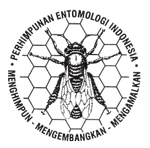Resistensi lalat rumah, Musca domestica Linnaeus (Diptera: Muscidae) dari empat kota di Indonesia terhadap permetrin dan propoksur
DOI:
https://doi.org/10.5994/jei.12.3.123Keywords:
LD50, MFO, synergist, toxicity, urban pestAbstract
House flies (Musca domestica Linnaeus) is one of the common urban pests causing health, economics, and aesthetics problems. Although intensive control by using inseticides are carried out, there are reports of control failures, which are probably due to insect resistance. Bioassay tests with topical application to study the status as well as resistance mechanism of house flies collected from the city of Jakarta (JKT), Bandung (BDG), Yogyakarta (YGY) and Surabaya (SBY) to pyrethroid (permethrin) and carbamate (propoxur) insecticides were carried out. The results show that, as compared to the most susceptible strain (YGY), we found that BDG strain is highly resistant to permethrin with resistance ratio (RR) of 133.7 fold. SBY strain was the most resistant to propoxur with RR of 38.36 fold, followed by Bandung strain with RR of 18.22 fold. The addition of piperonyl butoxide (PBO) to either permethrin or propoxur in most of the strains caused a decrease in LD50 values and increasing the synergist ratio (SR) suggesting that the detoxifying enzyme mixed function oxidase (MFO) played an important role in the development of resistance to permethrin and propoxur. Our study is the first report of M. domestica resistance to permethrin and propoxur in Indonesia.
Downloads
Downloads
Published
How to Cite
Issue
Section
License
Authors who publish with this journal agree to the following terms:
- Authors retain copyright and grant the journal right of first publication with the work simultaneously licensed under a Creative Commons Attribution 4.0 International License that allows others to share the work with an acknowledgement of the work's authorship and initial publication in this journal.
- Authors are able to enter into separate, additional contractual arrangements for the non-exclusive distribution of the journal's published version of the work (e.g., post it to an institutional repository or publish it in a book), with an acknowledgement of its initial publication in this journal.
- Authors are permitted and encouraged to post their work online (e.g., in institutional repositories or on their website) prior to and during the submission process, as it can lead to productive exchanges, as well as earlier and greater citation of published work (See The Effect of Open Access).








